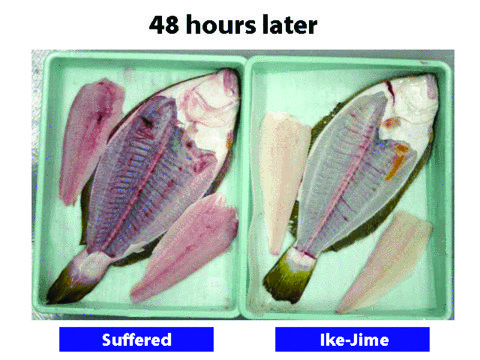
In the last years several Chefs from the World became interested in Ikejime, among them the renowned Chef Emerson Kim, an avid fisherman and prominent in Japanese cuisine, who has traveled the world learning and teaching in restaurants like Nobu in St Moritz, Switzerland, Matsuhisa, in Mykonos, Greece, and Amura, in Orlando, United States. He likes to take care of fish personally, using the Ikejime in his dishes to preserve the meat in the best texture and quality.
When the fish is removed from the water, it quickly begins to suffer a series of nervous stimuli, producing lactic acid. The lactic acid then produces a metallic flavor in the fish meat, and the degradation process is accelerated, generating the characteristic smell that we associate with fish (burnt tuna or yake meat syndrome, in Japanese). But the truth is that fresh and correctly slaughtered fish do not have an unpleasant smell.
In the Ikijime technique, the fisherman inserts a spike directly into the fish’s brain, preventing nerve stimuli from reaching the muscles and triggering the chemical reactions responsible for the bad odor.
Then, as the heart is still beating, 3 cuts are made to bleed the fish: 2 under each side of the gills and a third in the artery in the tail. The last step is to insert a rod through the spinal cord channel that cuts all nerve signals, preventing the generation of more lactic acid.
With the use of the Ikijime technique, the fish not only dies faster and without suffering, but its meat also has a much more refined flavor, with a whiter color and no clots, indispensable for maturing and reaching the maximum flavor of the fish with the development of salts and can still be preserved for longer.





